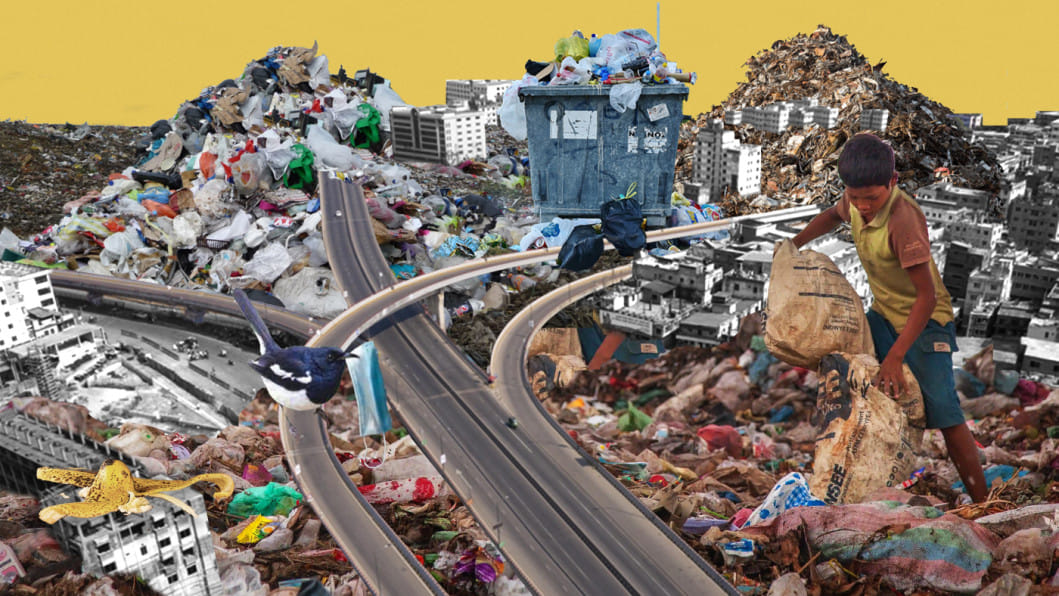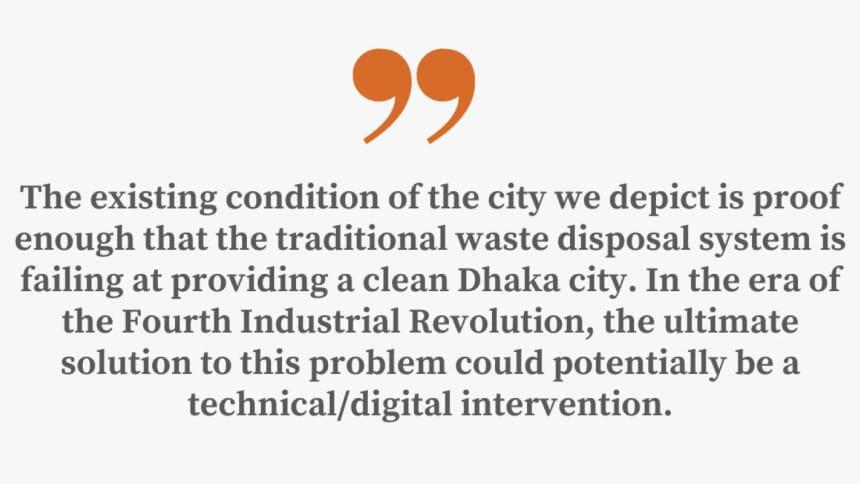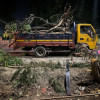Dhaka has a waste management problem

South Asians have a deep attachment to traditions – whether it is a mother making delicacies on Eid morning, or waking up to the tune of Esho he Baishakh playing in the neighbourhood on Pahela Baishakh. We cherish these traditions like hidden treasures. Then there are other traditions that deserve a second (or third) look. For example, Dhaka is holding on to a traditional waste management system that has changed little since its independence in 1971. This system allows indiscriminate and open dumping and burning, and disposal of waste into the air, water bodies, landfills, and even directly into agricultural land in the rural areas. Even after 50 years, such behaviour continues unabated and is treated as normal.
Modern societies are, in fact, challenged to manage unprecedented amounts of waste generated by changes in consumption patterns, abetted by uncontrolled urbanisation. Of the more than 2.01 billion tonnes of waste produced globally, roughly a third is not even managed in an environmentally safe manner. According to one study, "about 5,000 tonnes of waste is being generated in Dhaka city every day." Only half of that amount is properly collected and dumped, while the other half remains untreated.
Conversations with the general public suggest that even when there are good intentions to recycle, the available facilities are simply inadequate. There is no provision to separate the different types of recyclables; so, even if they are separated at home, they all end up in one big pile during collection. Others pointed to a lack of incentives to recycle; rather, they pointed to the enormous effort required to recycle regularly – all to no avail. For some, it was not worth the effort.
The system of waste collection and management in Dhaka is quite disorganised and completely outdated compared to other modern cities. The traditional waste collection system is a labour-intensive process and uses few modern technical solutions. This system consists of three main collection stages: Primary collection, secondary collection, and a final journey to the landfills, all of which work in a linear fashion. At the primary stage, we see the tokais (child waste collectors who should be going to school instead) strolling in and scavenging from the streets, or rickshaw vans going from one building to another collecting waste. The ugly sight of the plastic sacks overfilled with rubbish is hard to ignore. This, unfortunately, is what the primary waste collection of the city looks like.

All the rubbish collected is then dumped into giant bins, which could be placed in many more selected street corners, but that, unfortunately, is not the case. The unsorted and unseparated pile of garbage, at these secondary collection points, often remains uncollected for days. This situation is not only unsightly and makes it unbearable for people in the vicinity to breathe; it also creates conditions for many waste-borne diseases to spread and infect the general population. It is a potential public health time bomb waiting to explode.
One lucky day, these bins, filled with a concoction of waste and disease-laden microbes, are emptied into garbage-collecting trucks, which make their way through the centre of the city to the outskirts while announcing their presence with obnoxious odour, while spilling some of the garbage along the way. The landfill is where the garbage reaches its final destination. These landfills are playgrounds for the tokais, who climb the grey mountains pulsating with hidden health hazards while scavenging for recyclable treasures to sell to recycling shops at a minimal price.
Indeed, the story of Dhaka's garbage has not changed much as one might hope or imagine since the country's independence. But what has changed is the waste production per capita, as Dhaka's population has increased manifold with rapid urbanisation. As a result, it is no surprise that Dhaka has unfortunately become one of the world's dirtiest, polluted, and unliveable cities with garbage piling up everywhere – may it be the streets, the schools, the shops lining both sides of public thoroughfares, the parks where one goes for an evening stroll, and even areas surrounding one's home! All of this contributes to painting the picture of the city as a huge garbage bin. Is this what an aspiring middle-income country ought to look like? What does this do to the country's image?
The existing condition of the city we depict is proof enough that the traditional waste disposal system is failing at providing the citizens of Dhaka with a clean city. In the era of the Fourth Industrial Revolution, the ultimate solution to this problem could potentially be a technical/digital intervention. The challenge is to make the existing system smarter, more efficient, and with economic returns – both direct and indirect. With the introduction of smart technology, the existing rickshaw vans collecting waste can be upgraded into efficient waste collection vehicles. A smart sensor chip at the top of the bins can help send information to waste collection facilities when the bins are full, triggering a regular pattern for waste collection. Smart solutions like these will allow the authorities to have better control over the collection and regulation of the waste, resulting in a cleaner city with happier, healthier citizens. These options are explored in several episodes to follow.
This op-ed, the first of a four-part series, resulted from the authors' participation in the 23rd ASEF Summer University (ASEFSU23) interdisciplinary hackathon on "Livable Cities for a Sustainable Future" envisioned by Asian and European young professionals and students.
Sayeda Shahpara Shah is an architect based in Pakistan.
Dr Syed Saad Andaleeb is distinguished professor emeritus at Pennsylvania State University and former vice-chancellor of Brac University.

 For all latest news, follow The Daily Star's Google News channel.
For all latest news, follow The Daily Star's Google News channel. 









Comments